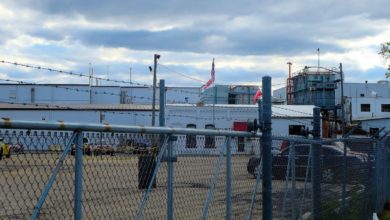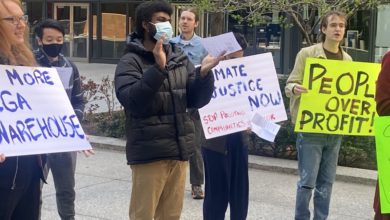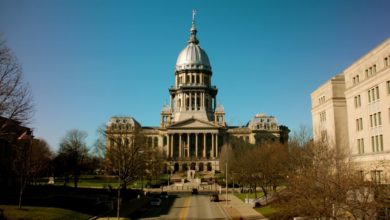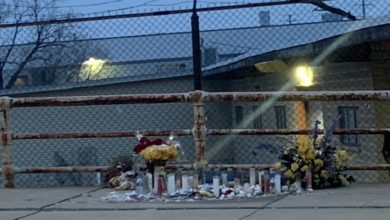On Nov. 14, more than 150 protesters rallied outside Chicago Mayor Lori Lightfoot’s home demanding that serial polluter General Iron be denied a permit to operate a scrap yard on the city’s Southeast Side. The protest had been named “Block the Permit Block Party,” referencing the final operating permit that General Iron will need the City to approve before it can begin operations in 2021. Protesters lined the street outside Mayor Lightfoot’s house wearing masks reading “Stop General Iron” and holding signs like “3 times less income, 60 percent more asthma,” pointing to the decades of institutional racism in the City of Chicago.
The event began with musical performances from a local artist and marching band before moving into a series of speeches from community members, long-time activists and local aldermen demanding that the City listen to its residents on the Southeast Side. “The Southeast Side is earning another pollutant in their community,” said Alderman Byron Sigcho-Lopez. “That is not acceptable. It is immoral and it is wrong.” Olga Bautista of the Southeast Side Coalition to Ban Petcoke told the crowd of protesters and media personnel: “It is blatant disregard. They are sending a strong signal to us that our lives don’t matter.”
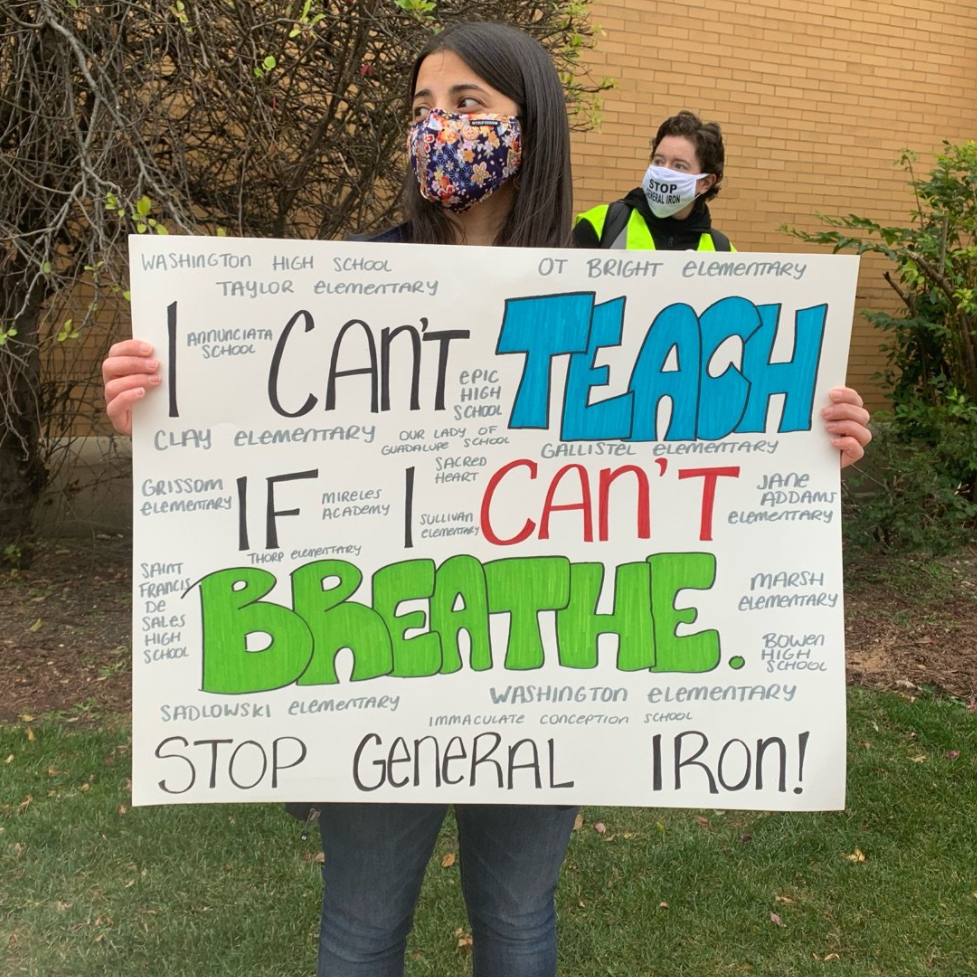
With construction for the $8-million scrap yard already underway, residents of the Southeast Side stood in front of Mayor Lightfoot’s house with a clear message: stop letting companies pollute our neighborhoods. Isis Pasalua, a protester, told Liberation News: “I have lived on the Southeast Side my entire life. I have been dealing with asthma because of petcoke (petroleum coke). I have nieces that don’t deserve asthma because of General Iron. We’re not Chicago’s dumping site.” Pasalua was referencing the 30-foot tall piles of petcoke which used to litter the banks of the Calumet River on Chicago’s Southeast Side until local activists compelled the City to modify how and where petcoke is stored. Since the petcoke piles were eliminated, the company KCBX — a Koch Industries subsidiary — still transfers petcoke from rails to trucks which releases dangerous particulates that can drift into nearby homes and lungs.
General Iron currently operates a scrap yard located along the east bank of the Chicago River’s North Branch in Lincoln Park. The scrap yard — sitting next to family homes, schools and playgrounds — has a long history of air quality violations and has been at odds with local residents for many years. The company recently paid an $18,000 settlement to the City of Chicago for numerous pollution violations, including two explosions in May which resulted in a thick cloud of smoke drifting over nearby homes. The scrap yard also sits close to the site of the lucrative $6 Billion Lincoln Yards development project which is set to break ground in 2021. Facing pressure from local residents, the City and developers alike, General Iron has decided to move its operation to a site along the Calumet River on Chicago’s Southeast Side. This site is only one mile away from George Washington High School.
At one point the largest steel manufacturing region in the world, the Southeast Side is now one of the most heavily polluted areas in the city. While the steel mills have closed, the lead and manganese they left behind continue to pollute the air and land. Manganese at higher concentrations has been linked to brain-damage and no amount of lead exposure is safe for children according to the Environmental Protection Agency and Centers for Disease Control and Prevention. According to an EPA soil study conducted in 2018, of the 100 homes sampled on the Southeast Side, 42 had lead levels in the top few inches of soil exceeding the federal cleanup standard for areas where children play. Susie Black, a protester who had made the trip to Mayor Lightfoot’s house from the Southeast Side told Liberation News: “I’m a mom and I have asthma thanks to Petcoke. I don’t want that for my daughter.”
A glance at Chicago’s Air Quality and Health Index paints the picture immediately. Areas that are predominately Black and Brown, namely the West and South side have much worse air quality, than predominantly white areas.
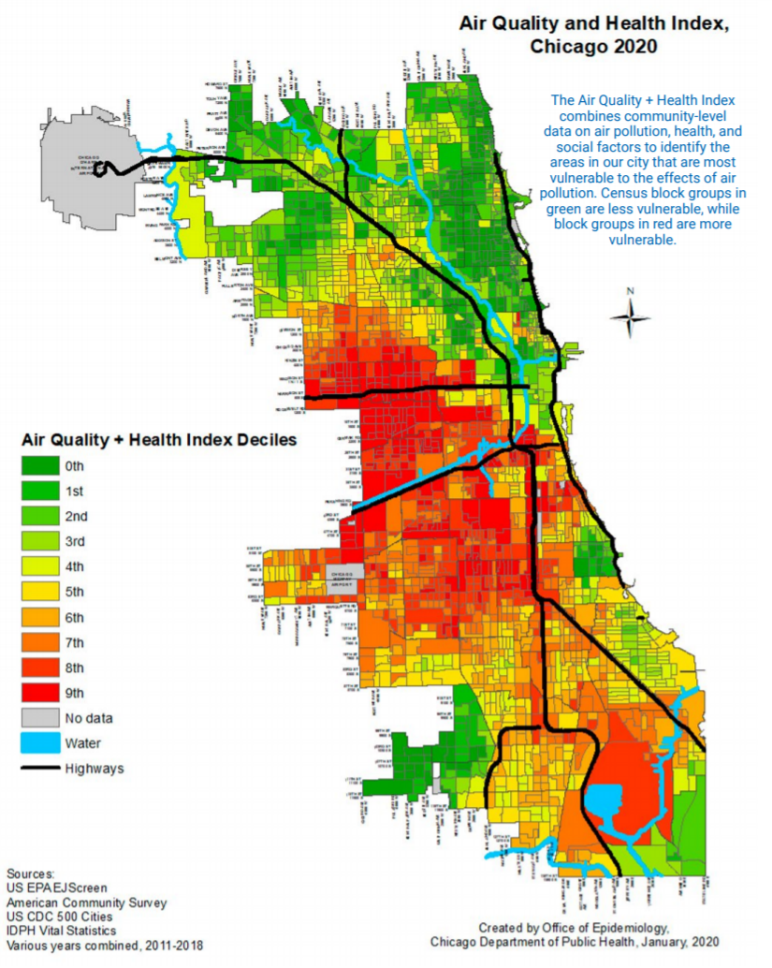
The Block Party ended with a march around the neighborhood. Accompanied by a marching band and protesters with bullhorns, a popular chant was echoed throughout the streets of the Logan Square neighborhood: “What do we want? Clean air! When do we want it? Now!” Evan St. Germain, a member of Chi Nation Youth council which is an inter-tribal Native youth council in Chicago, told Liberation News: “I’m here to stop General Iron from moving to the Southside. There are already so many companies on the Southside that pollute the land. Since the pilgrims first landed here, this country has done nothing but disrespect the land. This is just another example of that.”


